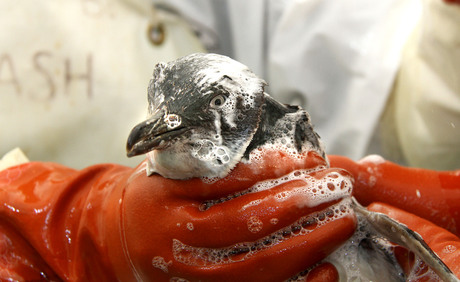Global training program to rescue wildlife from oil spills

Two universities have launched Oiled Wildlife Response Training (OWRT) — a comprehensive training program based around preparing for, and responding to, wildlife affected by oil spills.
Jointly developed by New Zealand’s Massey University and the University of California Davis, OWRT is the only research-led training program developed and delivered by universities with comprehensive oiled wildlife response programs. Both Massey University and UC Davis are global leaders in responding to oil spill emergencies, having collectively led more than 70 international responses, and are part of the government response teams in New Zealand and California.
Delivered through a combination of online and face-to-face teaching, the program will cover all aspects of oiled wildlife response, including planning field search and collection, cleaning and rehabilitation, development of oiled wildlife facilities, preparedness and emergency crisis management. The online component uses modern and interactive technology to create an engaging, activity-based learning experience which includes gaming, animation and quizzes.
The ability to study online is a core component of the program, as accessibility to training is a major issue. As noted by Dr Kerri Morgan, director of Wildbase Oil Response at Massey University, “Oil spills often occur in remote regions or in developing countries where training in oiled wildlife response is cost- or distance-prohibitive.
“For example, Australia is one of the best prepared countries in the world for oiled wildlife response, but its vast landmass makes training first responders in remote communities, such as those in Western Australia, very challenging. The distance-learning component of OWRT is really going to help in this respect.”
“Time is our enemy during oiled wildlife response,” said Dr Mike Ziccardi, director of the UC Davis Oiled Wildlife Care Network. “The faster we can get to animals and get them into care, the more likely they will survive after being oiled. People and companies who take part in OWRT, as a key part of a comprehensive oiled wildlife readiness program, will reduce the time of uncertainty at the start of a spill by immediately enabling trained people to employ best practices to respond to animals in need.”
The first OWRT training course will be offered in July, with additional courses rolled out over the following 12 months. OWRT will have multiple training paths based on what roles oiled wildlife responders need to fill in an oil crisis — from entry-level personnel to team leader positions and advanced response planning and management roles. The training will equip individuals to take up oiled wildlife response positions anywhere in the world.
For more information on the program, visit www.owrt.org.
Circularity needed at scale for Aust building industry
Australia has the highest material footprint of the G20, more than 31 tonnes per person. Doubling...
Textile recycler BlockTexx wins Gold for sustainability
BlockTexx, a clean technology company that recovers polyester and cellulose from textiles and...
NSW passes legislation to mandate battery recycling
The passing of the Product Lifecycle Responsibility Bill in New South Wales is said to...










